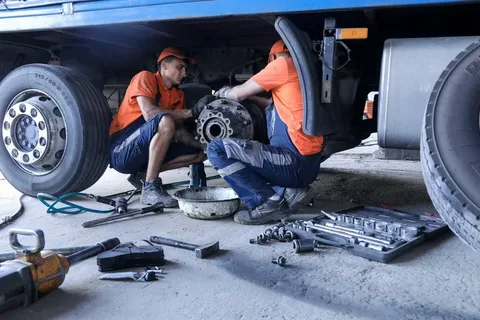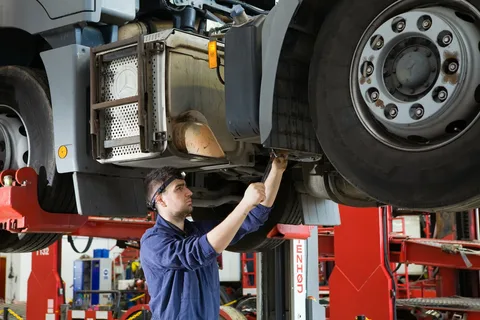Are you a trailer owner who has experienced the frustration of unexpected breakdowns and repairs? Whether you use your trailer for work or recreational purposes, it’s essential to keep it in top condition to ensure safe and smooth travels. However, no matter how well-maintained your trailer may be, problems can still arise. From flat tires to electrical glitches, there are a variety of issues that can affect your trailer’s performance. In this blog post, we will discuss some common Trailers Repairs and how to troubleshoot them. So, buckle up and get ready to learn how to keep your trailer rolling smoothly on the road.
Recognizing the Common Trailer Problems
When it comes to trailer repairs, it’s important to be proactive rather than reactive. By recognizing common trailer problems early on, you can prevent major issues and unexpected breakdowns. So, what are some common trailer problems to look out for?
One of the most common trailer problems is tire issues. Flat tires can occur due to punctures, worn-out treads, or incorrect tire pressure. Other common tire problems include blowouts and sidewall damage. Additionally, trailer owners often need help with their trailer lights. Burnt-out bulbs, loose connections, and faulty wiring can cause the lights to malfunction, compromising safety on the road.
Another common trailer problem is trailer hitch failure. A worn-out hitch or improper installation can lead to the detachment of the trailer from the towing vehicle, posing serious safety risks. Brake issues, such as worn-out brake pads or brake fluid leaks, can also impact trailer performance and safety.
Water leaks, damaged flooring, and rusted frames are other common problems that trailer owners may encounter. These issues can lead to structural damage, affecting the overall integrity of the trailer.
Understanding the Causes and Solutions to Trailer Flat Tires
One of the most common trailer problems that can leave you stranded on the side of the road is a flat tire. Whether it’s due to a puncture, worn-out treads, or incorrect tire pressure, flat tires can be a major inconvenience. So, let’s dive into understanding the causes and solutions to trailer flat tires.
Firstly, punctures can occur from nails, screws, or other sharp objects on the road. It’s important to keep an eye out for debris and try to avoid running over them. Secondly, worn-out treads can lead to flat tires. Over time, the tread on your tires wears down, reducing traction and increasing the risk of flats. Regularly inspecting your tires for signs of wear and replacing them when necessary can help prevent this issue.
Another cause of flat tires is incorrect tire pressure. Underinflated tires can increase rolling resistance, heat up, and wear out more quickly. On the other hand, overinflated tires are more susceptible to damage from road hazards. It’s essential to maintain the correct tire pressure recommended by the manufacturer for your trailer.
So, what are the solutions to trailer flat tires? The first step is to carry a spare tire and the necessary tools to change a flat. It’s also important to know how to jack up your trailer and replace the flat tire safely. Additionally, investing in quality tires that are specifically designed for trailers can help reduce the risk of flats.
DIY Fixes vs. Professional Trailers Repairs: Making the Right Choice
When it comes to trailer repairs, you may find yourself torn between attempting a DIY fix or seeking professional help. While DIY fixes can be a cost-effective option, there may be better choices for some situations. It’s important to weigh the pros and cons before making a decision.
DIY fixes can be a great option for simple and minor trailer repairs. If you have the necessary skills, tools, and knowledge, you can save time and money by tackling the problem yourself. It can be satisfying to successfully fix an issue on your own and gain a sense of independence.
However, it’s crucial to recognize your limitations. Some trailer repairs may require specialized expertise or equipment that you may not possess. In such cases, attempting a DIY fix can make the problem worse and lead to costlier repairs in the long run.
On the other hand, professional Trailers Repairs offer numerous benefits. Experienced technicians have the knowledge and expertise to diagnose and fix complex issues accurately. They have access to specialized tools and equipment, ensuring that the repair is done correctly the first time.
Professional repairs also often come with warranties or guarantees, giving you peace of mind knowing that the problem will be taken care of. Additionally, professional repairs can help you identify other potential issues that may not be immediately obvious, saving you from future breakdowns.
Decoding Electrical Issues in Trailers: An Overview
Electrical issues can be frustrating and difficult to diagnose, especially when it comes to trailers. However, understanding the common electrical problems that trailers face can help you troubleshoot and address them effectively. In this section, we will provide an overview of some electrical issues that trailer owners often encounter.
One of the most common electrical problems is a blown fuse. A blown fuse can cause various issues, such as malfunctioning lights, non-responsive brakes, or a dead battery. It’s important to regularly check and replace blown fuses to ensure the proper functioning of your trailer’s electrical system.
Another common electrical problem is a faulty connection. Loose or corroded connections can lead to intermittent or non-functional lights, brakes, or other electrical components. Inspecting and cleaning connections regularly can help prevent this issue.
Wiring problems are also common in trailers. Frayed or damaged wires can cause shorts, leading to electrical malfunctions. It’s crucial to inspect and repair any damaged wiring to avoid further issues.
Understanding these common electrical problems can help you identify and troubleshoot issues with your trailer’s electrical system. However, it’s important to note that electrical problems can be complex, and if you need clarification on handling them yourself, it’s best to consult with a professional technician.
Essential Maintenance Tips to Prevent Future Trailer Breakdowns
To ensure that your trailer stays in top condition and prevents future breakdowns, regular maintenance is essential. Here are some essential maintenance tips to keep your trailer running smoothly:
- Check and maintain tire pressure: Proper tire pressure is crucial for safe and efficient towing. Regularly check the tire pressure using a reliable gauge and adjust it to the manufacturer’s recommended level. It will help prevent flat tires and improve fuel efficiency.
- Inspect and maintain the electrical system: The electrical system is critical for the functioning of lights, brakes, and other components. Inspect all connections for signs of damage or corrosion and repair or replace as needed. Regularly check and replace blown fuses to prevent electrical issues.
- Lubricate moving parts: Moving parts such as hinges, latches, and bearings should be properly lubricated to reduce friction and prevent premature wear. Use a suitable lubricant recommended by the manufacturer for each specific component.
- Check and maintain the trailer brakes: The braking system is essential for safety while towing. Regularly inspect the brake pads and replace them if they are worn out. Ensure that the brake fluid is at the correct level and free of leaks.
- Inspect and maintain the trailer frame: Inspect the trailer frame for signs of rust, cracks, or damage. Address any issues promptly to prevent further deterioration.
Maximizing Trailer Efficiency with Regular Inspections
To ensure that your trailer continues to perform at its best, regular inspections are key. By conducting routine checks and maintenance, you can maximize trailer efficiency and prevent potential breakdowns on the road.
Start by inspecting the tires. Check for any signs of wear, such as uneven tread or bulges, and ensure that they are properly inflated to the manufacturer’s recommended pressure. It will not only extend the life of your tires but also improve fuel efficiency and handling.
Next, pay attention to the trailer’s electrical system. Check all connections for any loose or corroded wires, and replace any blown fuses. Regularly testing the lights, brakes, and other electrical components will help ensure that everything is functioning properly.
Remember to lubricate the moving parts. Hinges, latches, and bearings should be properly lubricated to reduce friction and prevent premature wear. Using a suitable lubricant recommended by the manufacturer will keep these components in optimal condition.
Inspecting the trailer frame for rust, cracks, or damage is also important. Address any issues promptly to prevent further deterioration and potential safety hazards. Lastly, regularly clean and protect the trailer exterior. Washing and waxing the trailer not only keeps it looking good but also helps protect the paint and prevent corrosion.
FAQs
Have some burning questions about trailer repairs? Don’t worry; we’ve got you covered! In this section, we will answer some commonly asked questions about trailer repairs and troubleshooting.
Q: How often should I have my Trailers Repairs for potential problems?
A: It’s recommended to inspect your trailer at least once a month for any signs of wear and tear. Regular inspections can help you catch potential issues before they become major problems.
Q: What should I do if I notice a flat tire on my trailer?
A: If you have a spare tire and the necessary tools, you can change the flat tire yourself. However, if you need more clarification or need the equipment, it’s best to contact a professional for assistance.
Q: How can I prevent electrical issues in my trailer?
A: Regularly inspecting and maintaining the electrical system can help prevent issues. Check connections for any loose or corroded wires and replace blown fuses as needed. It’s also a good idea to have a professional technician perform a thorough inspection annually.
Q: How often should I replace trailer tires?
A: Tires should be replaced when the tread is worn down or when there are signs of damage. Regularly inspecting your tires and replacing them when necessary will help prevent flat tires and improve safety on the road.
Conclusion
In conclusion, keeping your trailer in top condition is essential for safe and smooth travel. By recognizing common trailer problems early on, you can prevent major issues and unexpected breakdowns. Whether it’s flat tires, electrical glitches, or other issues, understanding the causes and solutions can help you troubleshoot and address them effectively. While DIY fixes can be a cost-effective option for simple repairs, it’s important to know your limitations and seek professional help when needed. Remember to prioritize regular maintenance and inspections to maximize trailer efficiency and prevent future breakdowns. So, stay proactive and keep your trailer rolling smoothly on the road!



